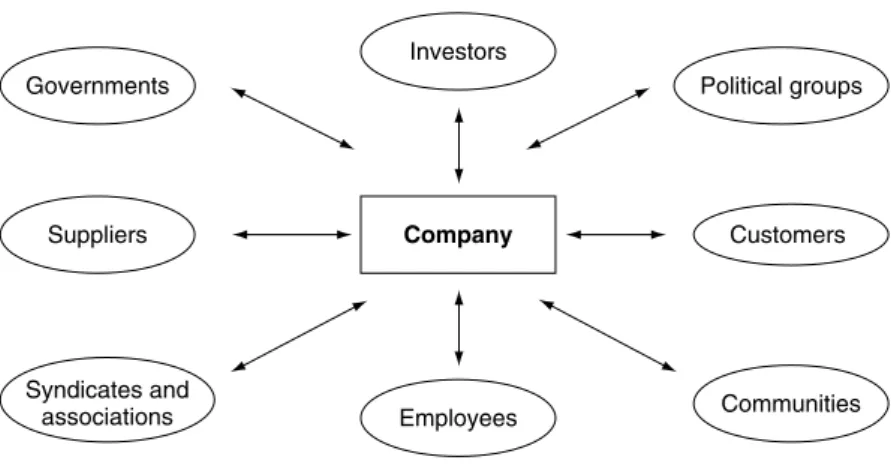Within this institution he is a member of the Management and Strategy department and of the research group CESAMES. Yvon Pesqueux is a professor at the CNAM (Conservatoire National des Arts et Métiers), head of the Chair of “Developpement des Systèmes d’Organization” with a PhD in economics, University of Paris 1 Panthéon-Sorbonne (1975).
Introduction
The nature of governance
Governance thus becomes a conception of the act of government for which the search for rules of action and a process of compromise between different parties is more important than the identification of the entity exercising the act of government. Objections have been made to the amorphous quality of the concept of governmentality within the economics of Foucault's oeuvre.
Liberalism’s governmental rationality
But to understand the meaning of the phrase "excess of government," we must refer to a kind of governmental rationality different from that of liberalism: Raison d'Etat. The dangerous logic of the Raison d'Etat position towards other states brought about this.
Beyond Michel Foucault: from liberal governmental rationality to governance
The nature of the institution should therefore not be sought in what it constitutes (a group), but in what it supports (the fact that it links one thing to another and makes this link credible and legitimate). At the same time, this maintenance of relations of reciprocity translates into an embedding of the economic in the cultural.
Conclusion
The basis of all this is freedom, the relationship of the self to itself and the relationship to the other. One manifestation of this would be a generalization of the idea that there really is a corporate social responsibility (CSR) model.
The question of an ‘Anglo-American’ type of organizational model
This translates the prevailing state of intellectual flux and explains both why the term of an 'Anglo-American' model was so hastily coined to describe a particular stream of CSR, and why the injection of a 'European' model into the equation introduces an implicit resistance. The question remains whether we should claim, alongside the implied cosmopolitanism of an 'Anglo-American'.
Are the ‘Anglo-American’ and ‘European’ CSR models fighting the same battle?
This is a new manifestation of the agonistic view1 (Mouffe, 1994) of the management project; it is utopian to refuse to recognize the existence of antagonisms within companies. This constitutes a reformulation of the 'old' layman's expression of economic liberalism, which equates corporate wealth with the wealth of nations, simply by assimilating corporate contractualism and the Social Contract.
The possible contours of a culturalist perspective of CSR
Stereotypes are born from the confrontation between two groups and express differences by using one group's terms to describe the other (comparative perspective). The problems raised by this brief discussion of the different ideas of ideal types, stereotypes and preconceptions also ask whether management tools cannot ultimately be interpreted in categories in much the same way as other tools are; that is, an 'Anglo-American' model of CSR can be as much an ideal-type as it is a presupposition.
Conclusion: from problems in ascertaining the existence of a ‘Anglo-American’ model of CSR to the proposal that CSR
The theme of governance also offers dimensions that can catalyze reinterpretations of the origins of performance, references to social interactions, procedures and values. Of course, this burdening the procedural side of things with efficiency involved a dialectical tension.
Presentation of stakeholder theory 1
Moreover, this study will defend the idea that the corporation – sue generis – is perhaps less liberal than its reputation might suggest.
A political interpretation of stakeholder theory applied to the corporation
The second reason is that modern political philosophy seems to have remained on the fringes of these central institutions of our society, which are large corporations.3 The organizational phenomenon still seems to be undeveloped in political philosophy.4 We therefore have to to think philosophically about this ensemble of mediating public institutions such as companies where governance and management processes are carried out.
An approach in terms of liberal philosophy
If the communitarians subscribe to communities of belonging with a view to attaining higher levels of anthropological realism, they do not seem to go so far as to develop the social totality, regarding the whole—society—as superior to its parts. The individualism of these three movements explains their attachment to the issue of human rights.
A liberal critique of the ‘stakeholders’ corporation’ model
Certain writers in the field propose to extend the classical idea of the social contract to base the corporation 'in reason'. This same inadequacy can be found in the question of the legitimacy of governance according to SHT.
What is the political nature of the ‘stakeholders’ corporation’?
Within the SHT framework, this raises questions about the legitimacy and composition of the general meeting of the stakeholder corporation. Finally, it also seems that the model of the stakeholder firm revives the issue of the firm as a potential object or subject, separate from all stakeholders.
Stakeholders as a call for the acceptance of responsibility
Applying the letter of the law, the court found the 'thieves' guilty but gave them minimum sentences. Subjects can choose to act or not to act, but they cannot hide from the demands of the situation in which they find themselves.
Stakeholders as a call to duty: between constraints and obligations
As he floats gently on the waves of his prefabricated future or his past, he eschews all opportunities to live in the present of the world in which he finds himself. The absence of external obligations does not at all mean that Mercadier is free of all restrictions.
Responsibility as an external constraint that generates improved competitiveness
It is the level of the values at stake that will determine the new dimension of rationality ('Werrational'). Corporations' incorporation of the environment into the moral determination of their actions has been turned inside out.
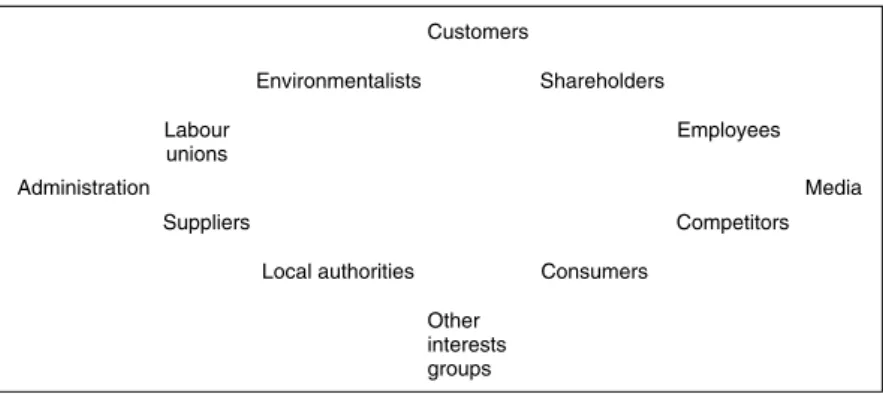
Demystifying the role of managers in stakeholder interactions
This perception is likely based on managers' previous experiences and subjective interpretations of the environment. However, much remains to be done in terms of understanding the dynamic interaction of stakeholders (Margolis and Walsh, 2003).
Institutional theory and the role of institutions in stakeholder relations
The state, its policies and the culture of the country are some examples of macro-institutional factors. It is therefore likely that the position of and relationship between the stakeholders will be affected by this particular configuration.
The role of the business system in stakeholder position and interactions
1987) 'The Adolescence of Institutional Theory', Administrative Science Quarterly, nr. 2001) Institutioner og organisationer (Thousand Oaks, CA: Sage). A Research Strategy for Corporate Social Performance', Academy of Management Journal, nr. 1999) 'Creative Deconstruction: Strategy and Organisations', i S.R.
The impossible re-integration inside the economic calculation
Corporate social responsibility must put society at the center and look beyond the interests of the company. But if the company is concerned about society, it is only in terms of the survival of the environment in which the company makes a profit.
Faceless responsibility
More than a scientific theory, it is a political act.5 The customers, the communities, the government are essentially stakeholders, effectively or potentially. Isn't that the danger that CSR faces now - the danger of becoming just another code, a new equation for calculation.
The contribution of stakeholder theory
The degree of importance given to each party by the company director will depend on the urgency of the situation and the legitimacy and power of the stakeholder concerned (Mitchell, Agle and Wood, 1997). It put an end to the conflict by requisitioning the dock workers in the name of the Taft-Hartley Act of 1947.
Adapting stakeholder theory to HRM analysis
Paradoxically, it was not the Minister of Social Affairs (M. Fillon), or the Minister of Industry and Economy (M. Mer), or even the Minister of the Environment (Mrs. Bachelot) – the company that is of a polluting nature – who was put in charge of this matter. For example, a company preparing a layoff plan can expect legal and influential action from the labor inspectorate.
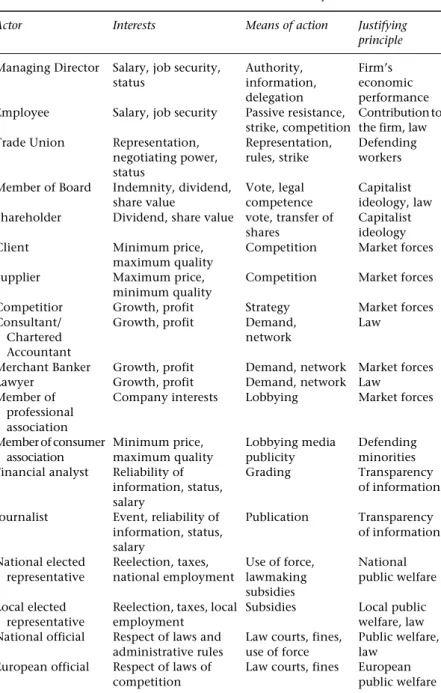
The dynamics of the stakeholders system
This was widely covered in the media and strengthened public opinion in favor of the employees. 1995) 'The Stakeholder Theory of the Corporation: Concepts, Evidence and Implications', Academy of Management Review, vol.

Contractual arrangements underlying stakeholder relations
We first present a critique of the main theories of contracts in relation to theories of agents and their relationships. First, delegation allows the agent to act and make decisions instead of the principal.
Stakeholders as ‘interactors’: knowledge-based relationships
Antonacopoulou and Jérôme Meric 135 and purely economic considerations, stakeholders and firms interact in the sense of Mead (1934) or of Berger and Luckmann (1966). In the same way that competition is seen as 'co-petition' (Bradenburger and Nalebuff, 1996; Post, Preston and Sachs, 2002), interest group relationships can likewise be repositioned.
Stakeholder learning partnerships: a case for the interdependency contract
They distinguish between three dimensions of social capital: the "structural", "relational" and "cognitive" dimensions. More fundamentally, learning partnerships are based on knowledge – the way knowledge and learning are socially constructed in practice (Brown and Duguid, 2001).
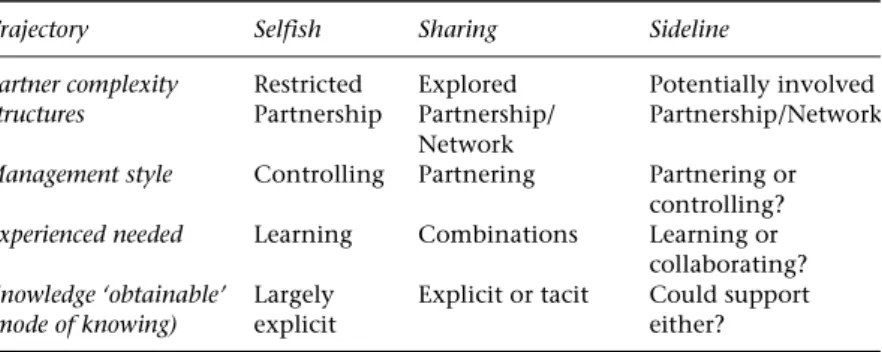
Conclusions
1992) 'Stakeholder - Agency Theory', Journal of Management Studies, vol. 2002) 'Learning, Knowledge Management and Strategic Alliances: So Many Studies, So Many Unanswered Questions', i P. Lloyd (eds), Cognition and Categorization (Hillsdale), s. 1998) 'Deconstructing Economic Stakeholder Theories or Is Might really Right ?', Critical Perspectives on Accounting, vol. 2002) 'What is Organizational Knowledge?', Journal of Management Studies, vol.
The objectivity of accounting measures: a screen for conflicting interests
For example, people who are in charge of the accounting process are called under the heading 'the management'. Moreover, the concept of the three Ps (planet, profit, people), which is often presented in the field of CSR, provides a prior justification for deviating from the principles of a real social responsibility if, for example, economic conditions would be unfavorable (for example, a return on equity that would be lower than expected by investors).
Subjectivity as a founding principle for any evaluation: the coming onstage of the self as a condition for responsibility
We must link a specific criterion to each of the dimensions: relevance for the subjective dimension, coherence for the rational dimension, and performance (in a narrow sense6) for the objective dimension (Figure 9.2). The philosopher Henriot (2003) explains that “in the syntax of ethics, responsibility and exercise of the subjective function are only one thing.
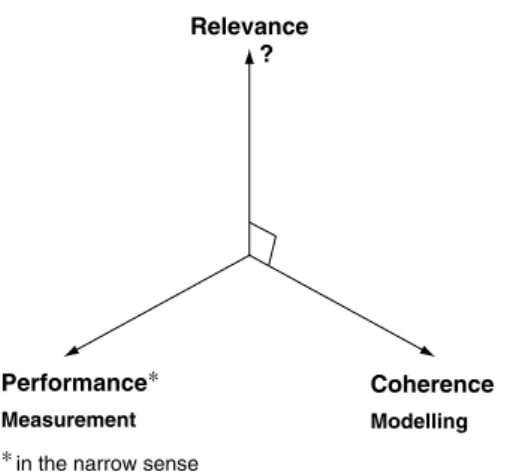
Acceptance of inter-subjectivity: a means to call on the Other (stakeholders) to speak
Mutelesi (1998), referring to this conceptualization, defines it as "the reciprocity in the relationship between 'I' and 'you'. Of course, “the conditions of access to the Internet do not in themselves guarantee more democracy.
Notes
Sur l'éthique de la discussion (Paris : Les Editions du Cerf, 1992, traduit de l'allemand Erlaüterungen zur Diskursethik, Suhrkamp Haus). MEDEF – PricewaterhouseCoopers, (2003) « Prise en compte de l'article 116 de la loi NRE dans le rapport de gestion des sociétés au CAC 40 », www.pwcglobal.com.
Social rating: a symbolic performance measurement
The various steps of the assessment process are only a normative choice by which the representation of performance is constructed and an assessment is given. The poor level of information collected limits the quality and reliability of the assessments assigned by the agencies.
Social rating and CSR enactment
1983) “The Iron Cage Revisited: Institutional Isomorphism and Collective Rationality in Organizational Fields,” American Sociological Review, no. 2004) “Measuring the Unmeasured: An Institutional Entrepreneurial Strategy in an Emerging Industry,” Human Relations, vol. 1497) "The Debate Over Corporate Social Performance and Financial Performance: Twenty-five Years of Unparalleled Research," Business and Society, vol.
